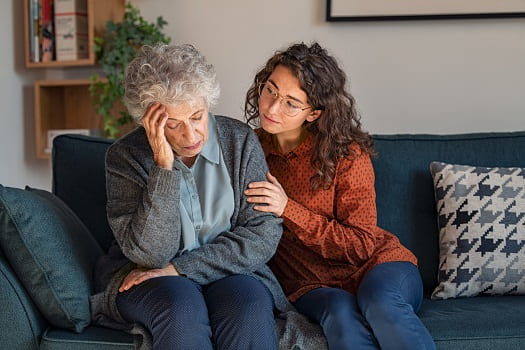Denial is a powerful psychological tool sometimes used as a defense mechanism until a person can get used to a new health diagnosis. However, seniors who are in denial about dementia diagnoses place their safety and health at risk. If you provide care for a senior loved one, it’s important to understand denial is often masked as other behaviors that may be used to hide a senior’s challenges or avoid difficult conversations. Knowing how to spot these common signs of denial can enable you to get your loved one the right type of help.
Anger
Many caregivers discover that a senior who’s normally easygoing may suddenly get defensive when the topic turns to dementia. Older adults who lash out in anger may simply be trying to cover up their fear. Although it may be challenging, stay calm during your loved one’s angry outbursts and make sure to revisit the conversation later.
Rationalizing
Seniors with dementia often come up with many excuses for their behavior. Attempts to rationalize may be as simple as claiming they were too tired to remember missed doctors’ appointments, or they might create elaborate explanations for why they got lost in familiar neighborhoods. Seniors in denial also frequently claim their memory lapses are just the result of normal aging.
Attempts to Cover Up Challenges
As dementia progresses, a senior in denial may try to hide problems caused by decreasing mental abilities. For example, your loved one may hide that he or she forgot to eat dinner or claim an unpaid bill never arrived in the mail.
Aging in place can present a few challenges for seniors living with dementia. However, they can still live independently at home with the help of professional dementia care. Green Valley families can rely on Embrace In-Home Care to provide their elderly loved ones with mental and social stimulation, timely medication reminders, assistance with meal prep, and much more. Our caregivers are available around the clock to help your loved one live a happier and healthier life.
Refusal to Seek Treatment
Seniors who have yet to be diagnosed may refuse to talk to doctors about their memory lapses because they’re afraid they’ll be told they have dementia. A senior who remains in denial after a diagnosis may claim the doctor doesn’t know what he or she is talking about and refuse to follow the treatment plan.
Caring for a loved one with dementia can be challenging, but you don’t have to go through it alone. If your senior loved one has been diagnosed with a serious condition and needs help with tasks like meal prep, transportation, bathing, and grooming, reach out to Embrace In-Home Care, a leading provider of homecare families can trust. We also offer comprehensive care for seniors with dementia, Alzheimer’s, and Parkinson’s.
Continuing to Place Themselves at Risk
Seniors who are in full denial may continue to do activities that put their safety at risk. Getting in traffic accidents, getting lost, and forgetting to turn off major appliances can all add up to serious problems if denial continues.
Isolation
Social events can often cause anxiety for seniors who are in denial about their dementia. They may skip family dinners and holiday events where it may be obvious that they cannot remember names or follow normal routines. If your loved one suddenly begins to isolate him or herself from others, it may be time to address the topic directly.
If your loved one is living with cognitive decline due to dementia or another condition, compassionate help is just a phone call away. Families looking for top-rated Green Valley elderly home care providers can reach out to Embrace In-Home Care. From respite care to specialized Alzheimer’s, dementia, stroke, and Parkinson’s care, there are many ways we can make life easier for seniors and their loved ones. For reliable in-home care services, contact us today.
